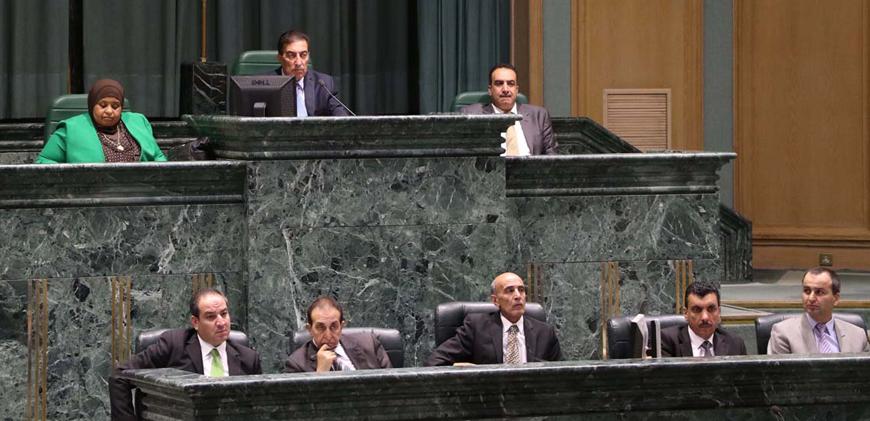You are here
House polarised over decentralisation bill
By Raed Omari - Aug 18,2015 - Last updated at Aug 18,2015

Lawmakers chat on the sidelines of a Lower House session on Tuesday (Photo by Osama Aqarbeh)
AMMAN — The House on Tuesday witnessed a heated discussion over the draft proposal of the decentralisation law, with critics arguing that there is no need for such a piece of legislation in the first place.
The opponents called on the government to withdraw the key reform bill, citing, among other points, the financial costs on the Treasury.
These lawmakers claimed that “in reality the bill enhances centralisation by granting governors a higher degree of authority”.
For others, the law fails to define a governorate as an administratively independent entity as well as failing to tackle the “developmental problems” of governorates.
The law is “vague” and “hollow”, deputies argued, saying that the government could present a similar decentralisation project through the creation of a bylaw which would take less of an economic toll on public finances.
On the other hand, some MPs praised the law, reminding those sceptical of its purpose that it will tackle the long-awaited decentralisation issue.
MP Khamis Atiyeh, head of the joint parliamentary committee that examined the bill, said that members of the panel held brainstorming meetings with citizens across the country regarding the law.
“All those we met have praised the law and its contributions to enhancing the public participation in the decision making process,” Atiyeh said.
Supporters of the bill also cited its contribution to achieving reforms and the role of the democratisation process in giving citizens the chance to be more engaged in deciding and planning development projects in the community to which they belong.
Responding to MPs who rejected the proposed law, Prime Minister Abdullah Ensour highlighted that the draft decentralisation law has been extensively discussed with citizens, and reiterated the bill’s’ “immense” contribution to the democratisation process.
Ensour also stressed that the law is constitutional, and that the government is fully aware of the financial costs of the bill.
On MPs’ demands to implement the envisioned reform through a bylaw and not a law, Ensour replied that individuals elected under a bylaw cannot supervise those elected under a law.
Related Articles
AMMAN — Women’s rights activists on Thursday hailed the Lower House’s decision to designate a 15 per cent quota for women in governorate cou
AMMAN — The dispute between the government and the Lower House over the draft decentralisation law has been resolved with a compromise to po
AMMAN — MPs were divided on Sunday over the 2015 parliamentary elections bill with some calling for sending it back to the government, while


















